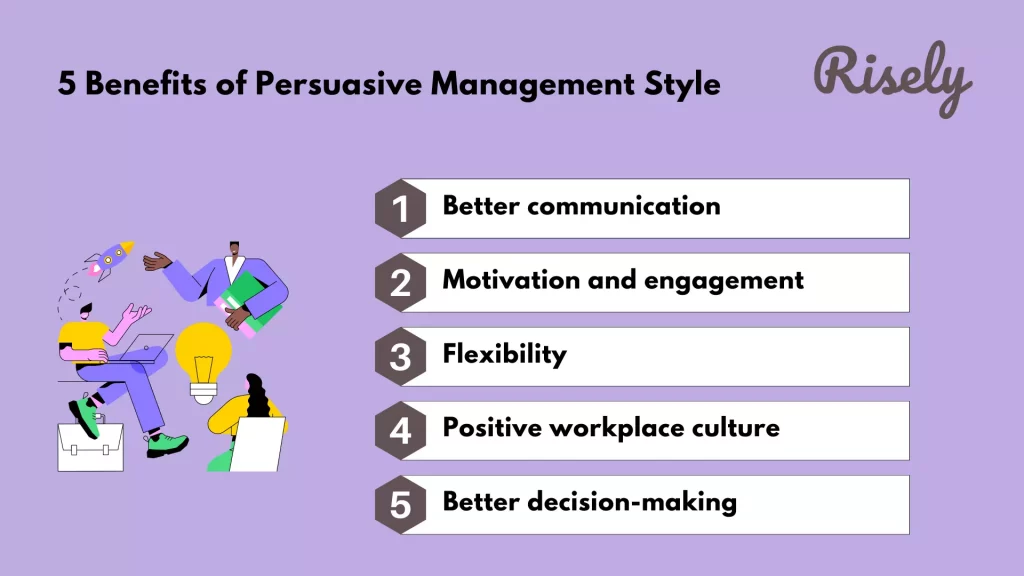How Persuasive Management Style Helps You Succeed: 5 Examples And Benefits
Imagine you’re leading a team on an expedition. You have a clear destination in mind, but the path is filled with obstacles and challenges. How do you get your team to not only follow you, but to be genuinely motivated and excited about the journey? That’s the power of persuasive management. This approach isn’t about barking orders or wielding authority. It’s about building trust, inspiring your team, and using your influence to guide them towards achieving a shared goal. Intrigued? Then keep reading, because we’re about to embark on a deep dive into the persuasive management style. We’ll explore what it is, when it works best, the pros and cons, and the characteristics of those who’ve mastered this leadership approach. We’ll even provide some practical tips to help you hone your own persuasive management skills and turn your team into a high-performing expedition crew!- How Persuasive Management Style Helps You Succeed: 5 Examples And Benefits
- What is a Persuasive Management Style?
- When is the Persuasive Management Style Effective?
- 5 Benefits of Persuasive Management Style
- Limitations of Persuasive Management Style
- Characteristics of Persuasive Leaders
- 5 Persuasive Management Style Examples
- Simple Methods for Improving Persuasive Management Skills as a Manager
- Conclusion
- FAQs
- Other Related Blogs
What is a Persuasive Management Style?
A persuasive management style is a leadership approach where a manager or a leader uses persuasive communication to influence and motivate employees toward achieving a specific goal or objective. This management style involves persuading team members to take a particular action or follow a specific direction while also maintaining a positive relationship with them. The leader typically relies on their communication skills, including active listening, clear messaging, and addressing employees’ concerns to persuade them to follow their lead. Persuasive managers may also use rewards and incentives to encourage employees to take action or achieve specific targets. The persuasive management style can be effective in situations where a manager needs to inspire and motivate their team to achieve a particular goal. However, it can also be challenging if the manager overuses their persuasive skills, leading to a lack of trust and resentment among team members. Therefore, a persuasive manager must balance influencing their team and respecting their autonomy and individual opinions.When is the Persuasive Management Style Effective?
The persuasive management style can be effective in certain situations, such as:- During times of change: When a company is going through a period of transition, such as a restructuring, a persuasive management style can help managers effectively communicate the benefits and rationale for the change and gain employee buy-in.
- When introducing a new idea: When introducing a new concept or initiative, a persuasive management style can help managers to persuade employees of the benefits and potential positive outcomes of the idea and gain their support.
- When there is a need for collaboration: When a manager needs to encourage collaboration and teamwork among employees, a persuasive management style can help persuade team members to work together towards a common goal.
- When managing a crisis: During a crisis, a persuasive management style can help effectively communicate with employees, keep them informed about the situation, and persuade them to take necessary actions to address the crisis.
5 Benefits of Persuasive Management Style
The persuasive management style can provide a range of benefits for both managers and employees, including
- Better communication: Managers who use a persuasive management style are often skilled communicators who effectively convey their ideas and objectives to employees. This can lead to a better understanding and clarity of expectations, resulting in higher productivity and engagement.
- Motivation and engagement: A persuasive management style can motivate and engage employees by providing direction and purpose. By persuading employees to buy into a particular vision or objective, managers can help to foster a sense of ownership and pride in their work.
- Flexibility: The persuasive management style can be adapted to fit the needs of different situations and employees. It allows managers to tailor their approach to each individual’s needs, which can result in better relationships and higher levels of job satisfaction.
- Positive workplace culture: By using persuasive communication and focusing on collaboration and teamwork, a persuasive management style can help to create a positive workplace culture. Employees who feel heard and valued are more likely to be productive and committed to their work.
- Better decision-making: A persuasive management style can facilitate better decision-making by encouraging employees to share their ideas and opinions. This can lead to more innovative solutions and better outcomes.
Other Interesting Reads
Limitations of Persuasive Management Style
While the persuasive management style can be effective in certain situations, it also has its drawbacks, which include the following- Overreliance on persuasion: Managers who rely too heavily on persuasion may struggle to establish clear boundaries with employees. This can result in a lack of trust and respect from employees, who may feel that their opinions and ideas are not valued.
- Lack of diversity: A persuasive management style can sometimes lead to a lack of diversity of ideas and perspectives. Managers who are too focused on persuading employees to adopt a particular view may be less open to alternative opinions and ideas.
- Resistance from employees: Some employees may resist persuasion, particularly if they feel their autonomy is being threatened. If a manager’s persuasive tactics are too forceful, it can lead to employee resentment and disengagement.
- Ineffective communication: While a persuasive management style can be effective in certain situations, it can also lead to ineffective communication if managers are not skilled communicators. If they struggle to convey their ideas and objectives, it can lead to confusion and misinterpretation among employees.
- Short-term focus: Managers who rely on persuasion may focus more on achieving short-term rather than long-term objectives. This can lead to a lack of strategic vision and planning, which can impact the success of the business in the long run.
Characteristics of Persuasive Leaders
There are several characteristics that persuasive leaders typically possess
- Strong communication skills: Persuasive leaders can communicate their message clearly and effectively. They are skilled at tailoring their message to their audience and using compelling and convincing language.
- Charisma: Persuasive leaders often have charisma that draws people to them. They can inspire and motivate others with energy, passion, and enthusiasm.
- Confidence: Persuasive leaders are confident in themselves and their abilities. They can project this confidence in their communication and decision-making, which helps build trust and credibility with their followers.
- Emotional intelligence: Persuasive leaders can understand and connect with the emotions of their employees. They can empathize with others and use this understanding to build rapport and influence others.
- Strategic thinking: Persuasive leaders can think strategically and develop a clear vision for the future. They can articulate this vision to inspire and motivate others to follow them.
- Flexibility: Persuasive leaders can adjust their message and approach based on feedback and changing circumstances. They are open to new ideas and perspectives and are willing to change course when necessary.
- Authenticity: Persuasive leaders are authentic and genuine. They are true to themselves and their values, which helps to build trust and credibility with their followers.
5 Persuasive Management Style Examples
Sales Team Supercharge
Imagine you’re leading your sales team to launch an exciting new product. Picture yourself standing in front of your team, vividly showing how this product will transform customers’ lives. Use your charismatic communication skills to fuel their excitement, and watch their energy skyrocket as they envision the impact they’ll make and the rewards that await their hard work.Change Management
You’ll lead your team through a significant change. As you gather them together, share your passion for the new direction. Address their concerns empathetically, and weave a compelling narrative about the positive outcomes awaiting the company and each individual. With your persuasion prowess, guide them through the transition, helping them see the bright future. Check out What Is Change Management At Work? 7 Proven HacksProject Kickoff
Imagine launching a game-changing project. As you bring your team into the project kickoff, ignite their passion by highlighting how their roles are pivotal to the project’s success. Let your persuasive charm shine as you connect their contributions to the company’s mission. By the end of your talk, they won’t just see tasks; they’ll see their chance to be heroes.Turning Setbacks into Comebacks
You’re facing an underperformance challenge within your team. Take the time to sit down with the struggling individuals. Listen actively to their concerns, showing that you genuinely care. Now, put your persuasive powers into action. Paint a picture of their potential growth, emphasizing how their success story is integral to the team’s journey. Watch as they regain their motivation and determination.Collaboration Catalyst
You’re leading a cross-functional effort. Step into the shoes of each team and imagine their perspectives. Weave a story of how their combined expertise will create something extraordinary as you bring them together. Your persuasive prowess will break down silos and ignite a spirit of collaboration as they unite for a common cause. Remember, a persuasive management style isn’t about manipulation; it’s about inspiring, leading, and rallying your team around a shared vision. Put yourself in their shoes, understand their hopes and concerns, and use your charisma and communication skills to guide them toward success.Simple Methods for Improving Persuasive Management Skills as a Manager
- Know your audience: To persuade someone, you must understand their needs, goals, and concerns. Take the time to get to know your team members and tailor your communication to their needs and preferences.
- Be clear and concise: Persuasive managers can clearly articulate their ideas and proposals. Avoid using jargon or technical terms that your team may not understand. Keep your message simple and easy to follow.
- Use storytelling: Stories can be a powerful tool for persuasion. Use examples and anecdotes to illustrate your points and help your team members connect emotionally with your message.
- Build credibility: If you want to persuade others, they must trust you. Build credibility by demonstrating your expertise and delivering on your promises.
- Listen actively: Persuasion is a two-way street. Take the time to listen to your team members’ concerns and feedback. This will help you better understand their perspective and tailor your message accordingly.
- Be open to feedback: Accept feedback graciously and use it as an opportunity to improve your persuasive management skills. Encourage your team members to share their thoughts and ideas with you.
- Practice, practice, practice: Persuasion is a skill that can be developed with practice. Look for opportunities to practice persuasive communication skills, such as presenting to your team or participating in debates or discussions.
Conclusion
In conclusion, persuasive management is a powerful leadership style that can help managers achieve their goals by inspiring and motivating teams. By using effective communication, emotional intelligence, strategic thinking, and authenticity, persuasive leaders can build trust, influence, and rapport with their employees. This approach is particularly effective in today’s fast-paced and constantly changing business environment, where adaptability and flexibility are key. By adopting a persuasive management style, leaders can create a positive work culture, improve employee engagement, and drive better business outcomes. If you are a leader looking to enhance your management approach, consider incorporating some critical characteristics of persuasive management into your leadership style. With dedication and practice, you can become a more effective and persuasive leader, inspiring your team to reach new heights of success.How persuasive are you as a manager?
Find out now with the free persuasion skill assessment by Risely in just a few minutes.
FAQs
What is an example of persuasive management?
A manager may use persuasive techniques to convince team members to adopt a new process or strategy. They may present compelling arguments, provide evidence and examples to support their point of view and engage their team members in discussions to address any concerns or objections.
Why persuasive is a management style good?
The persuasive management style is beneficial because it allows managers to influence and motivate their team members toward achieving common goals. Using persuasive techniques, a manager can create a shared vision and a sense of ownership among their team members, increasing productivity and job satisfaction.
How to become a persuasive manager?
To become a persuasive manager, one should develop strong communication skills, including the ability to articulate their ideas clearly, listen actively to others, and adapt their communication style to the needs of their audience.
What is the role of persuasion?
The role of persuasion is to influence the attitudes, beliefs, and behaviors of others toward a specific goal or outcome. In management, persuasion is essential for motivating and aligning team members toward shared objectives, making persuasive communication a critical skill for effective leadership.
Other Related Blogs
Top 10 Games for Negotiation Skills to Make You a Better Leader
Top 10 Games for Negotiation Skills to Make You a Better Leader Negotiation skills are essential in today’s workplace and can be honed through various methods. One fun and effective…
Top 15 ways of Improving influence and negotiation skills
Top 15 ways of Improving influence and negotiation skills As a manager, influence and negotiation skills are crucial to your success. It’s not just about getting the best deal or…
How to develop the 8 Conceptual Skills every Manager needs?
How to Develop the 8 Conceptual Skills Every Manager Needs? It’s no secret that success in any professional field hinges on thinking critically, strategically, and creatively. That’s where conceptual skills…
10 Smart Hacks to Master Persuasion Skills for Managers
10 Smart Hacks to Master Persuasion Skills for Managers Managers have a multitude of responsibilities. From ensuring the smooth functioning of their team to driving business results, they need to…


